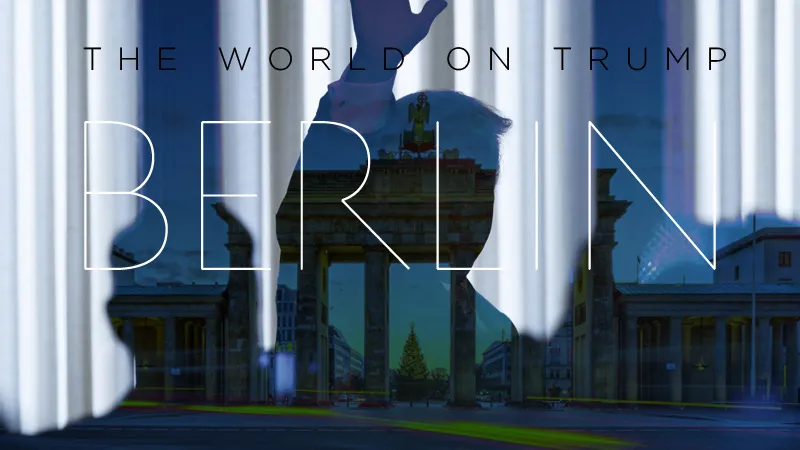-
CENTRES
Progammes & Centres
Location

This is the third part of a series on how the world sees Donald Trump's election to the US Presidency, and how such perceptions will affect India's foreign policy.
Read the first part here.
Read the second part here.
Berlin: While the United States and European Union have shown signs of drifting apart for some time now, Donald Trump's election victory is a serious blow to the trans-Atlantic consensus that has been the bedrock of the liberal institutional order. Long before the US presidential elections, it was clear to both parties that the complex network of post-War regimes that forged their strategic and economic alliance may have outlived its utility. The first signals emanated from Western Europe, when, under Jacques Chirac and Gerhard Schröder respectively, France and Germany chose not to support the 2003 US invasion of Iraq. Their decision was neither vetted nor endorsed by the EU, but reflected a diminishing appetite for military intervention in European capitals. In 2011, Germany — then a non-permanent member of the UN Security Council — abstained from the vote that triggered NATO's bombing of Libya, suggesting once again that it did not share America’s enthusiasm for a muscular foreign policy.
More recently, Edward Snowden's revelations gravely damaged political trust on both sides of the pond, resulting in the EU enacting stringent data protection legislation. Europe's Internet regulations have since dramatically diverged from the United States, marking the first time since the second World War that both sides have normatively differed on the global governance of common spaces. While the US and the EU agree, for instance, on the "multistakeholder" model of digital governance, the latter's approach to data localisation and e-commerce have been criticised by Washington D.C. as antithetical to a free and open Internet.
Finally, the failure to conclude the Trans-Atlantic Trade and Investment Partnership (TTIP) shows the political firepower required to see difficult, but norm-setting arrangements through has all but depleted. To be sure, the United States and EU have a long history of tariff-based disputes. But the stillborn TTIP is a sign that negotiating positions have hardened, and the leadership on both sides see little value in taking difficult decisions that may disrupt their economies in the short term but cement the multi-nation alliance in the long run.
Trump's election could well be the tipping point. The 'de-globalisation' impulse heralded by Brexit and the US presidential elections affects Europe in two significant ways. First, it has forced the continent’s political leadership to introspect if their traditional voter bases will be quickly usurped by radical movements, even for a short period of time. Second, Trump's election casts a doubt over the centrality of the trans-Atlantic consensus, already fragile and largely driven by personalities, such as outgoing US president Barack Obama and German chancellor Angela Merkel, whose party also heads to the hustings next year.
It is tempting to categorise the rise of radical movements in Europe as a "political" concern. However, mainstream parties in the EU are worried as much about the economic consequences of radicalism, as they are about its political effects. The European Union began as an economic and fiscal experiment that, over time, transformed into a political idea. The basis of the Union lay in instruments like the European Coal and Steel Community, which sought to create a common market for commodities. Integrated markets created "spillovers" into the monetary and political space, ultimately driving the creation of the EU. Radical movements in Europe today, whether from the left or right, resist the creation of any supranational authority to manage economic matters. Their populist measures appeal to small retailers and industries that stand to lose most from lowering of trade barriers. As a result, initiatives like the Digital Single Market — the closest the EU would have come to replicate its integration of the 20th century — are unlikely to make much headway. Even if populist political parties in Europe were only to enjoy a brief period in the limelight, their economic agenda will have lasting consequences — and Trump's election will only encourage them to pursue protectionist measures.
If Trump does not share his predecessor's commitment to strengthening the trans-Atlantic alliance, Europe is likely to look eastward for strategic partnerships. As the German economist Rolf Longhammer notes, this is the first time in two centuries that Europe has witnessed the uninterrupted transfer of wealth from one generation to the next. The creation of wealth itself was driven by post-War reconstruction and European technology exports, while the transfer happened on account of global stability. Both are now in question. If Europe's demographic future and its restrictive immigration policies pose a challenge to the creation of new wealth, Trump’s campaign statements have left European capitals wondering if the United States will no longer be the primary guarantor of trans-Atlantic security. To sustain its prosperity, therefore, Europe will continue to strengthen ties with Beijing, realising that Chinese capital will soon replace American dollars as the main source of project financing in Eurasia. But it is also likely that the EU will welcome a strategic partnership with China that extends gradually to defence cooperation. Beijing is not in any position currently to be a regional security provider, but its ability to manage Russia will be greatly valued in the EU.
It is too early to say if Trump’s policies will send the EU rushing to embrace China — but his election will certainly prompt Europe to renew its interest in Asia, seeing the region's future as linked to its own. To the extent Europe feels the locus of global affairs has shifted eastward, Beijing's involvement may be seen as crucial to the conception and articulation of 21st century institutions of governance.
The views expressed above belong to the author(s). ORF research and analyses now available on Telegram! Click here to access our curated content — blogs, longforms and interviews.

Hildegunn Kyvik Nords Senior Associate Council on Economic Policies Zurich and rebro University
Read More +